EU-China Summit Not Expected to Produce ‘Deliverables’ or Joint Statement
The Chinese flag(L) is draped beside the European Union (EU) flag.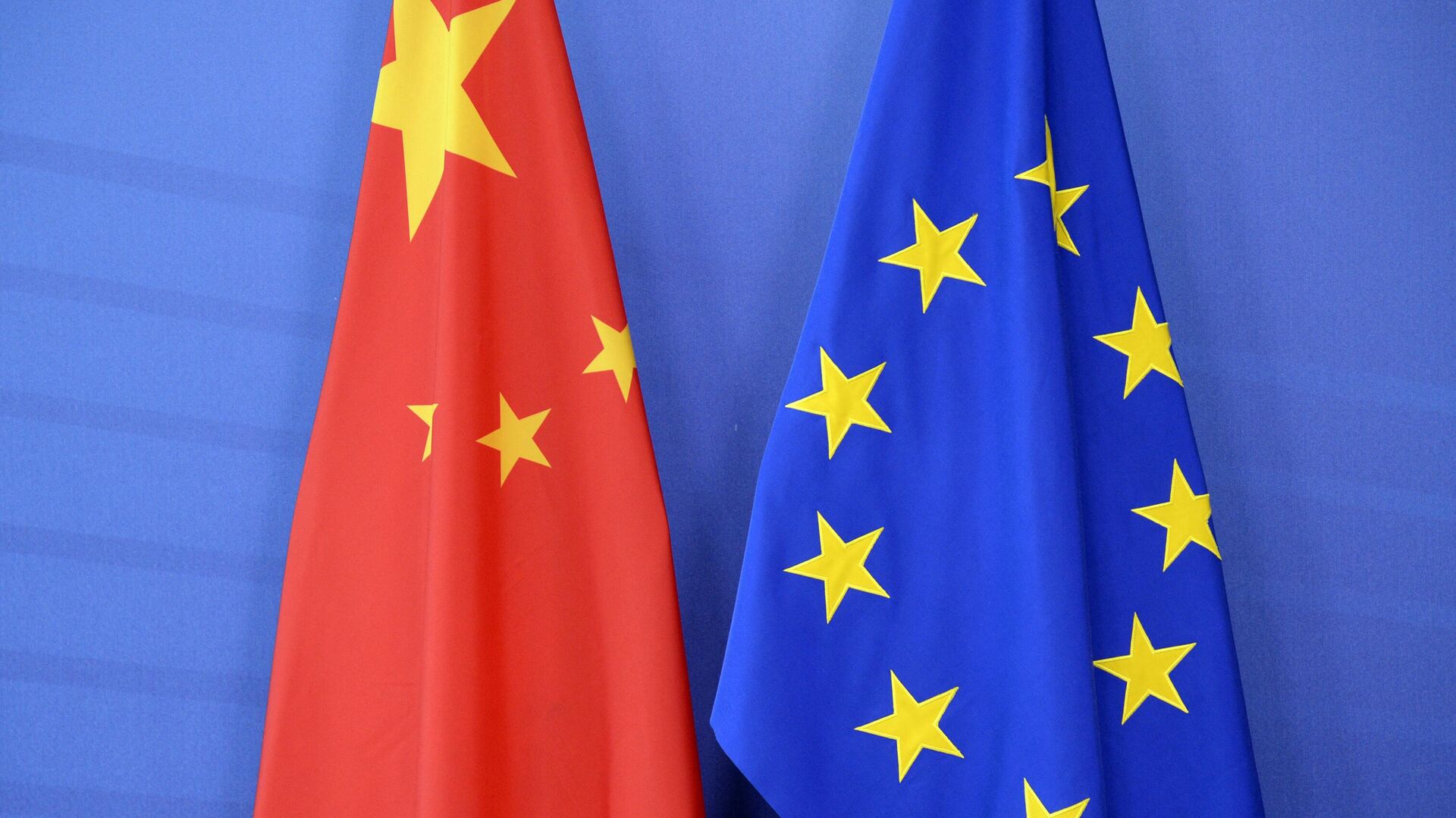
European Commission President Ursula von der Leyen, European Council President Charles Michel and EU foreign policy chief Josep Borrell traveled to Beijing to meet with Chinese President Xi Jinping and Premier Li Qiang for the first in-person EU-China summit since 2019 on Thursday.As a clique of European Union (EU) top officials set off on their one-day visit to China to address issues ranging from bilateral trade relations marred by reciprocal restrictions to global developments, such as Beijing’s unwavering support for Russia over the NATO proxy conflict in Ukraine, expectations for any major outcomes are low. Throughout the year, EU officials and leaders of member states have made a flurry of visits to China. However, it has become evident that meeting with Chinese officials while armed with a list of grievances does not create an environment conducive for achieving breakthroughs.For this occasion, visiting European Commission President Ursula von der Leyen, European Council President Charles Michel and top EU diplomat Josep Borrell are likely to have prepared and rehearsed their strong statements beforehand. Officials from Brussels had signaled that they intended to press Chinese President Xi Jinping and Premier Li Qiangon on a list of economic concerns, while in fact simultaneously continuing to embrace their protectionist push.”We have tools to protect our market,” von der Leyen argued ahead of the trip, albeit adding: “But we prefer to have negotiated solutions.” That being said, it is enough to take a quick glance at some charts to see how vital trade with China is for the European bloc. © Photo : International Trade Centre, Allianz ResearchScreenshot of chart by International Trade Centre, Allianz Research, showing key sectors of trade in which the EU depends on China.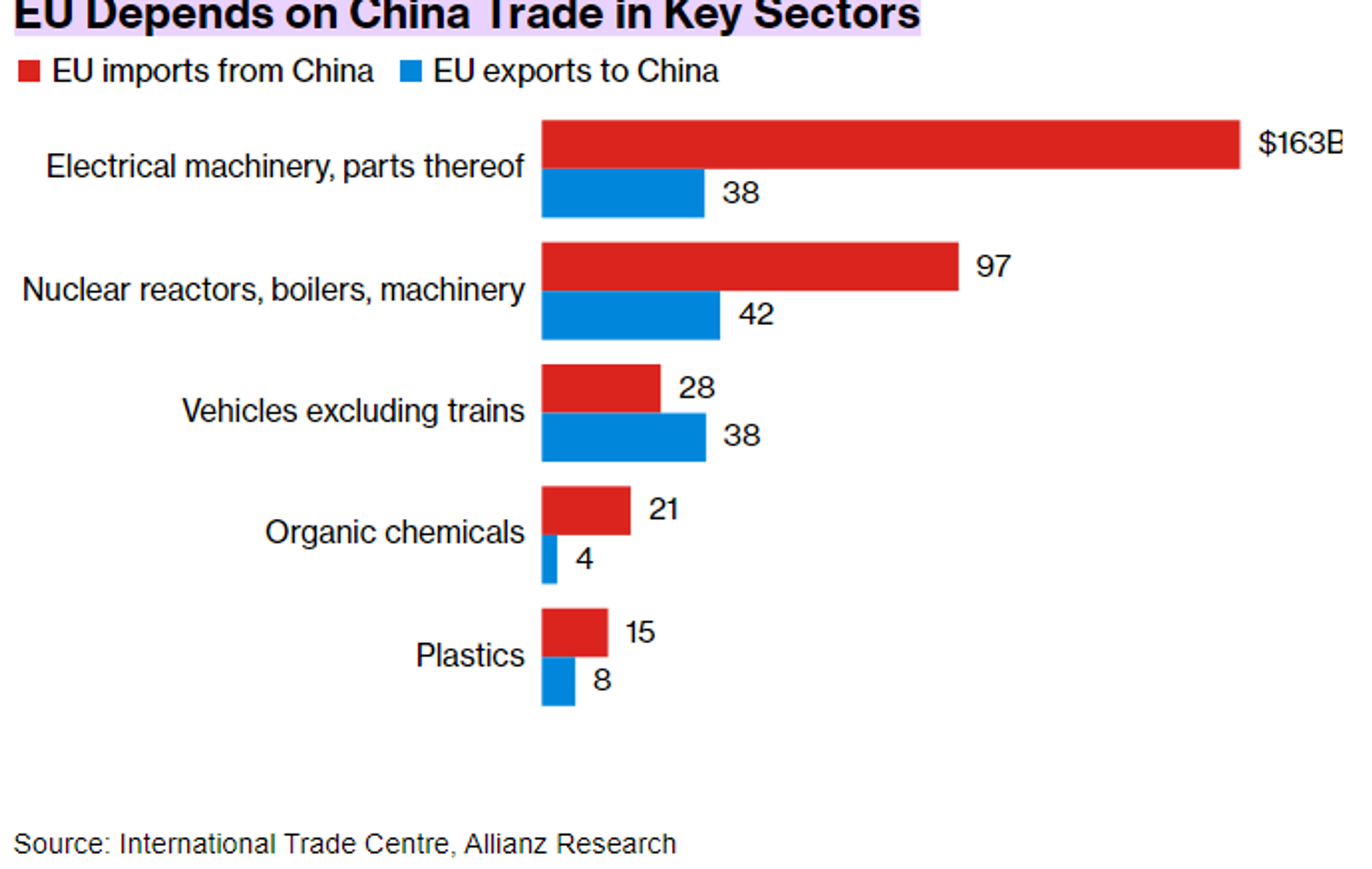 Screenshot of chart by International Trade Centre, Allianz Research, showing key sectors of trade in which the EU depends on China.During the first in-person meeting between EU officials and the Chinese leader in four years, held in Beijing on Thursday, Xi Jinping urged the bloc to work with Beijing to ensure global stability, boost mutual political trust and “eliminate all kinds of interference” in bilateral ties, according to the state broadcaster, CCTV. Foreign Minister Wang Yi called on both sides to engage in dialogue to avoid “bloc confrontation”. Additionally, the European officials will meet with Chinese Premier Li Keqiang. Yet, it is unlikely that a joint statement will be issued by the parties.Ahead of the summit, one European official was cited as acknowledging that “there’s not a single outstanding deliverable that will be crowning the summit.”
Screenshot of chart by International Trade Centre, Allianz Research, showing key sectors of trade in which the EU depends on China.During the first in-person meeting between EU officials and the Chinese leader in four years, held in Beijing on Thursday, Xi Jinping urged the bloc to work with Beijing to ensure global stability, boost mutual political trust and “eliminate all kinds of interference” in bilateral ties, according to the state broadcaster, CCTV. Foreign Minister Wang Yi called on both sides to engage in dialogue to avoid “bloc confrontation”. Additionally, the European officials will meet with Chinese Premier Li Keqiang. Yet, it is unlikely that a joint statement will be issued by the parties.Ahead of the summit, one European official was cited as acknowledging that “there’s not a single outstanding deliverable that will be crowning the summit.”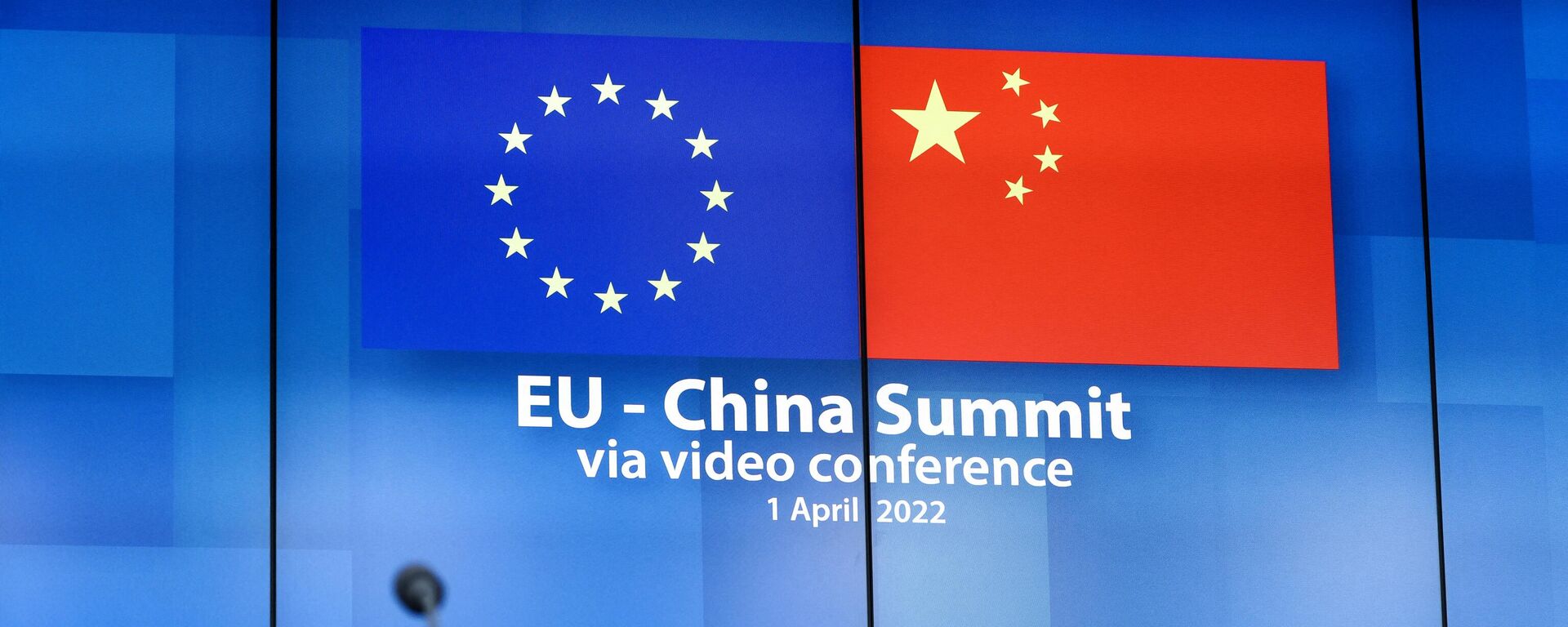 WorldEU-China Summit to Take Place in Beijing on ThursdayYesterday, 00:47 GMTIn November, von der Leyen yet again warned the EU’s 27 member states of the importance of ‘de-risking’ with China, levelling accusations of unfair competition at Beijing’s door.“Entire industries and value chains for which China used to rely on the rest of the world are being increasingly relocated domestically. Many European investors like to call this ‘in China for China’. However, this only works until European companies are squeezed out by Chinese competition or get caught up in political turmoil,” von der Leyen said.© Photo : EurostatScreenshot of Eurostat chart showing China’s position among the EU’s largest trade partners in 2022.
WorldEU-China Summit to Take Place in Beijing on ThursdayYesterday, 00:47 GMTIn November, von der Leyen yet again warned the EU’s 27 member states of the importance of ‘de-risking’ with China, levelling accusations of unfair competition at Beijing’s door.“Entire industries and value chains for which China used to rely on the rest of the world are being increasingly relocated domestically. Many European investors like to call this ‘in China for China’. However, this only works until European companies are squeezed out by Chinese competition or get caught up in political turmoil,” von der Leyen said.© Photo : EurostatScreenshot of Eurostat chart showing China’s position among the EU’s largest trade partners in 2022.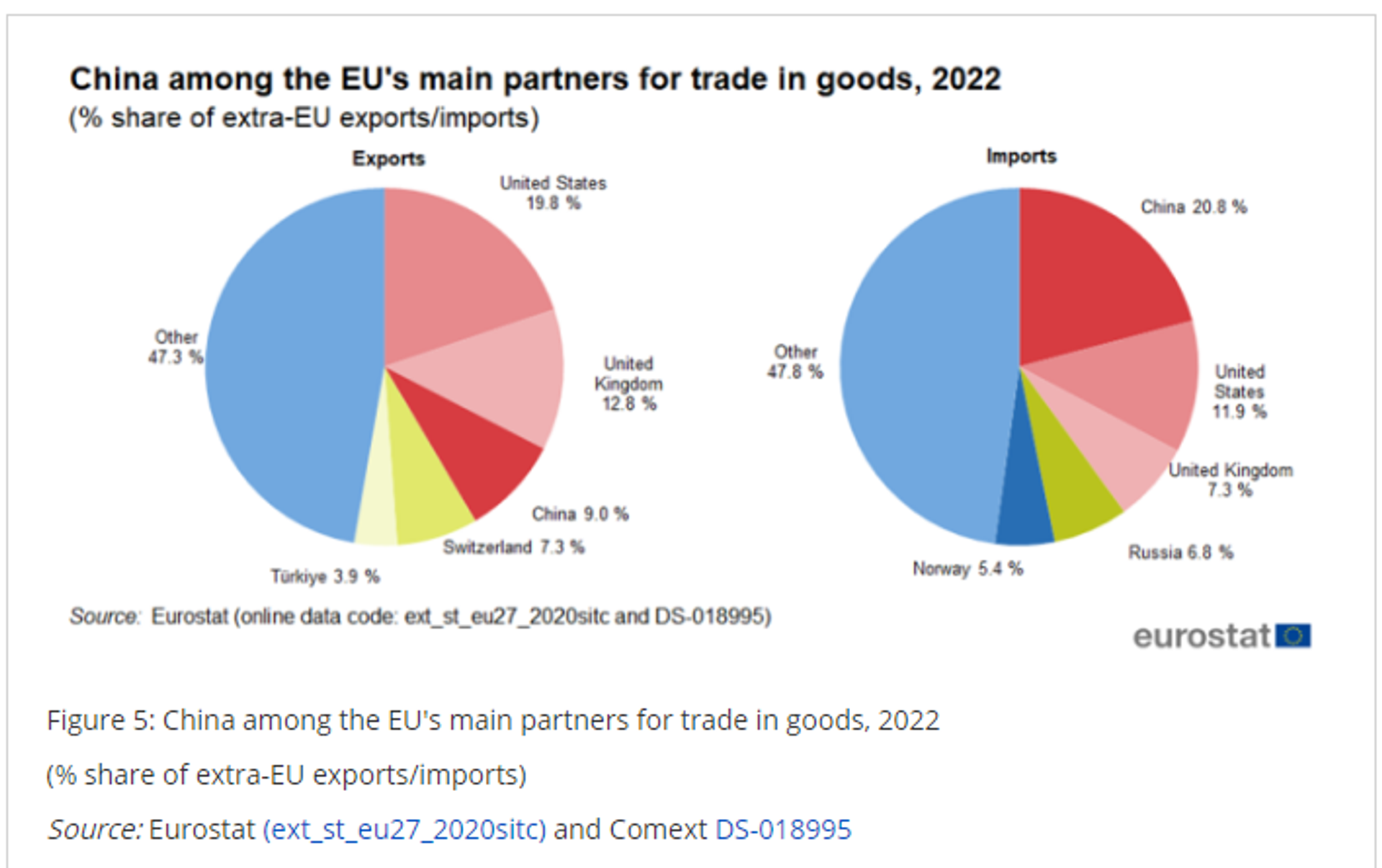 Screenshot of Eurostat chart showing China’s position among the EU’s largest trade partners in 2022.According to Brussels, the trade imbalance between the bloc and China has doubled in the last two years, going as high as almost 400 billion euros ($430 billion). Von der Leyen said the EU was “looking at the question of hidden and direct and indirect subsidies to Chinese companies in competition to the European companies”.In 2022, China ranked among the European Union’s largest trade partners for exports of goods, preceded by the United States and the United Kingdom. However, as part of its resolve to foster ‘equitable trade relations’ with Beijing, the EU recently initiated an anti-subsidy investigation into electric vehicles (EVs) made in China. Brussels believes that China’s alleged flooding of the market with affordable EVs is unfair. In response, the Chinese Commerce Ministry blasted the probe as a blatant manifestation of protectionist measures.
Screenshot of Eurostat chart showing China’s position among the EU’s largest trade partners in 2022.According to Brussels, the trade imbalance between the bloc and China has doubled in the last two years, going as high as almost 400 billion euros ($430 billion). Von der Leyen said the EU was “looking at the question of hidden and direct and indirect subsidies to Chinese companies in competition to the European companies”.In 2022, China ranked among the European Union’s largest trade partners for exports of goods, preceded by the United States and the United Kingdom. However, as part of its resolve to foster ‘equitable trade relations’ with Beijing, the EU recently initiated an anti-subsidy investigation into electric vehicles (EVs) made in China. Brussels believes that China’s alleged flooding of the market with affordable EVs is unfair. In response, the Chinese Commerce Ministry blasted the probe as a blatant manifestation of protectionist measures. 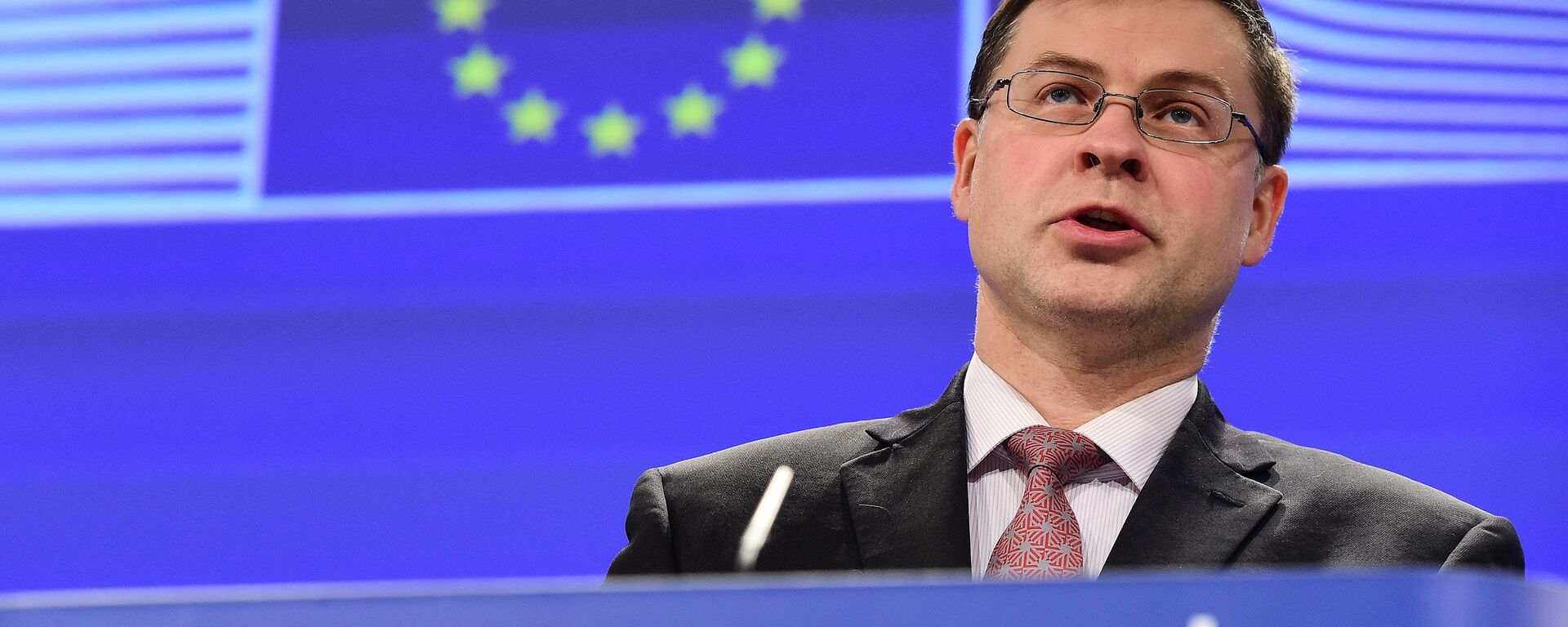 EconomyEU Flexes Muscles On ‘Fair Trade’ With China25 September, 13:42 GMTThe EU’s strategic “de-risking” agenda with China include measures to reduce risk and ensure security. This involves scrutinizing outbound investment and protecting the export of sensitive technologies. These technologies span advanced microelectronics, quantum technology, robotics, biotechnology, and artificial intelligence. In a document made public on June 30 by the European Council, China was positioned as “a partner, a competitor and a systemic rival.”As the EU enters an election cycle, navigating China ties poses a significant challenge. With European Parliamentary elections scheduled for next year, it is crucial to avoid ill-considered missteps that could have a serious impact on their results.
EconomyEU Flexes Muscles On ‘Fair Trade’ With China25 September, 13:42 GMTThe EU’s strategic “de-risking” agenda with China include measures to reduce risk and ensure security. This involves scrutinizing outbound investment and protecting the export of sensitive technologies. These technologies span advanced microelectronics, quantum technology, robotics, biotechnology, and artificial intelligence. In a document made public on June 30 by the European Council, China was positioned as “a partner, a competitor and a systemic rival.”As the EU enters an election cycle, navigating China ties poses a significant challenge. With European Parliamentary elections scheduled for next year, it is crucial to avoid ill-considered missteps that could have a serious impact on their results.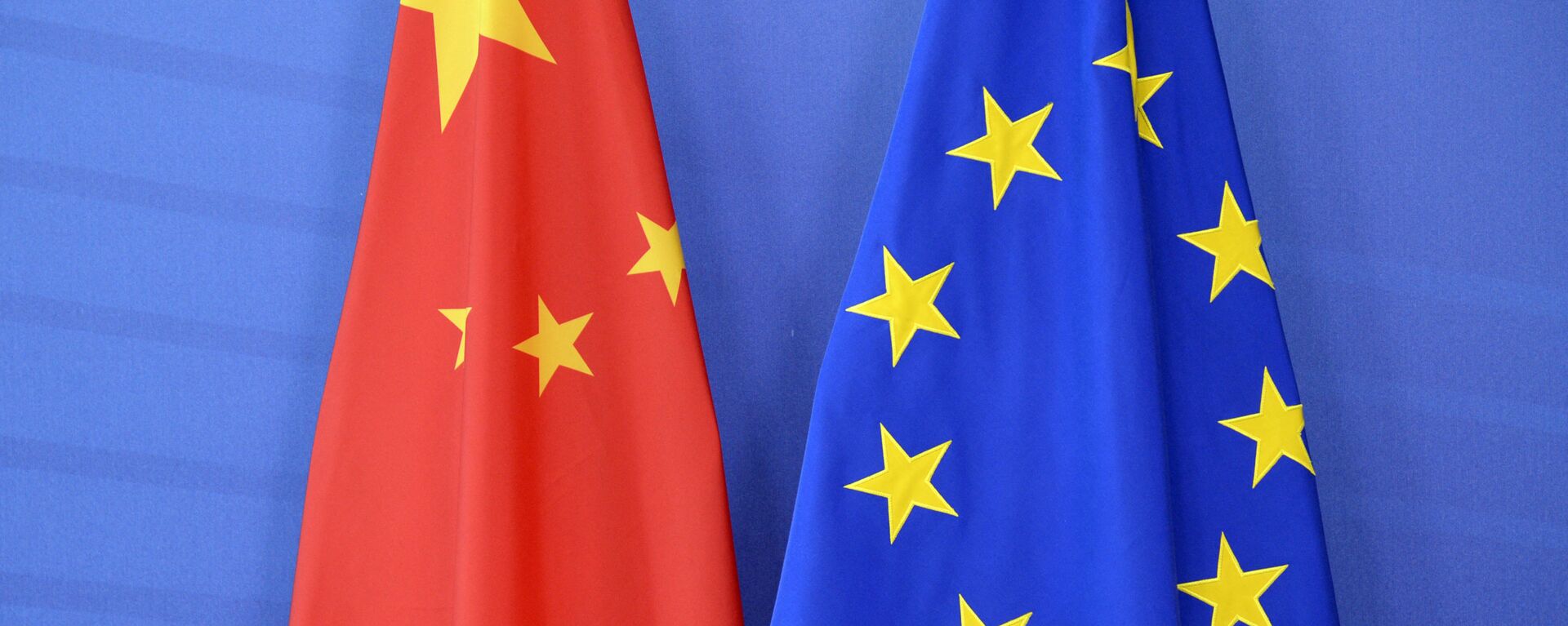 WorldChina, EU Ramp Up High-Level Exchanges ‘Amid Noise from US’11 May, 15:26 GMT
WorldChina, EU Ramp Up High-Level Exchanges ‘Amid Noise from US’11 May, 15:26 GMT



